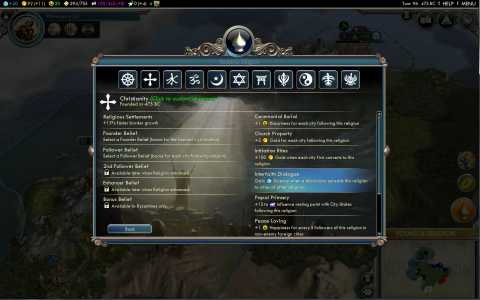I'll spare you the big overarching explanation of why Civilization V, and frankly the Civilization series in general, is a delightfully soul-devouring time suck. Many words have already been written on this subject, many of which are likely to be more eloquent than my own. All I will say on the subject is that if you have extricated yourself from Civ V in the time since its release in 2010, and hope to avoid plunging headfirst back down that rabbit hole of "just one more turn" addiction, then by all means, avoid the newly released Gods & Kings expansion back. Because if you don't, you're going to be sucked down that hole yet again, and God only knows when you'll find yourself able to wrest free of it again.

It's not that Gods & Kings does anything to especially revolutionize, or even dramatically improve Civilization V. In fact, for an expansion coming nearly two years after the game's original release (with only some DLC civilizations and map packs to supplement the time in between), it's actually a bit lighter on content than you might be expecting. However, the content that is in there is unquestionably good, making this expansion as devious a gateway back into the throes of Civ V addiction as you're likely to find nowadays.
The biggest addition to Gods & Kings is the religion mechanic. Though religion has existed in the series previously, the version of religion built for this expansion is far more detailed and involved than anything previously seen. It's in keeping with the spirit of the game in that it is a concept that can be built out in a variety of different ways that suit your particular play style. All religion is predicated on faith, which like science, production, and gold, you'll earn over time by building items and structures that increase it over time. Early in a game, you'll have the option to choose a "pantheon," a culture-specific religion that allows you one statistical benefit. This could be something as simple as more gold attained from spaces that generate faith, or more rapid border expansion via the "religious settlements" option. Once your pantheon is founded and your civilization begins to grow, you'll eventually spawn a great prophet, a unit that can be used multiple ways down the road, but initially will be consumed to create your religion.
Religion is non-specific in Gods & Kings. Which is to say that there are religions pre-made in the game that run the gamut from Christianity to Zoroastrianism, but it's not as though choosing Christianity will suddenly grant you a Jesus unit you can use to turn lakes into wine vineyards and eventually sacrifice for the sake of some kind of martyrdom boost. The names are just templates. You can name them whatever you want, actually, and the additional benefits you reap from the religion don't have any specificity to the religion itself. They're chosen by you when you first found, and then eventually improve your religion. Again, it's all tailored to how you want to play.
Like all things in Civilization V, religion is really more about expansion and diplomacy than anything especially holy. You can build prophets, missionaries, and even inquisitors to spread your religion and stamp out opposing religions. Making other cities and city states fall under your religious banner helps build influence with them. Likewise, pushing enemy cities into your kind of faith helps reduce resistance should you decide to conquer them. It doesn't mean they won't put up a fight, and in fact it may rile up the opposing leader to do something drastic against you. But if you use religion correctly, you'll be dominating the world in no time.
The other big mechanical change is espionage, a more passive mechanic that allows you to plant spies in rival civilizations' cities and city states. The key benefits to espionage are technology and alliances. Planting a spy in a city state ensures that your spy will continuously rig elections in your favor, and even conduct coups if the city state is loyal to another civilization. For major civs, you can place spies in key cities to both keep an eye on what rival leaders are planning, as well as potentially steal the technologies they develop. It's a helpful boost that gives you a bit more diplomatic interaction with your opposing civs, but truthfully it doesn't do a whole lot to change the overall flow of the game. It's just a nice little bonus that, frankly, you might just forget about as the game goes along.

Most of the other changes come in the form of tweaks to the existing game and in the form of new civs and items. There are nine new civilizations in Gods & Kings--including the Celts, Swedes, Carthaginians, Ethiopians, and more--each with their own unique units and abilities. In-game, you'll play Gods & Kings pretty much exactly as you did in the main game, though a few adjustments have made for a smoother experience, especially in combat. Ground units can now be stacked with naval units, making it easier to attack sea-adjacent cities, and combat in general has been switched from a 10-point system to a 100-point system. Opposing A.I. has definitely been improved a bit, though other civs can still be oddly non-aggressive when it's clear that you're about to start wrecking shop all over them. Their strategies have improved in some key areas, but with all the additional tools at your disposal to help depose your enemies, odds are you'll want to stick to some of the tougher difficulty levels if you want a noteworthy challenge.
All of this, plus three new scenarios, including the steampunk-themed Empire of the Smoky Skies (which I've detailed previously here) makes up this add-on. It's a good chunk of content that probably would have looked a lot more impressive a year ago. Given how much time and piecemeal DLC has passed since Civilization V first hit store shelves, Gods & Kings suffers only by virtue of not being overwhelming in its revamping of the Civ V formula. And yet, neither is it underwhelming, given that the things it does add are all distinct improvements, and some are even pretty fantastic. This is a useful and enjoyable expansion to a game that's still one of the great time-stealers of this generation. To put it succinctly: it is more Civilization V to add to your copy of Civilization V. If you still have even a flicker of a desire to play more Civilzation V, that news should be all you need to justify picking up Gods & Kings.